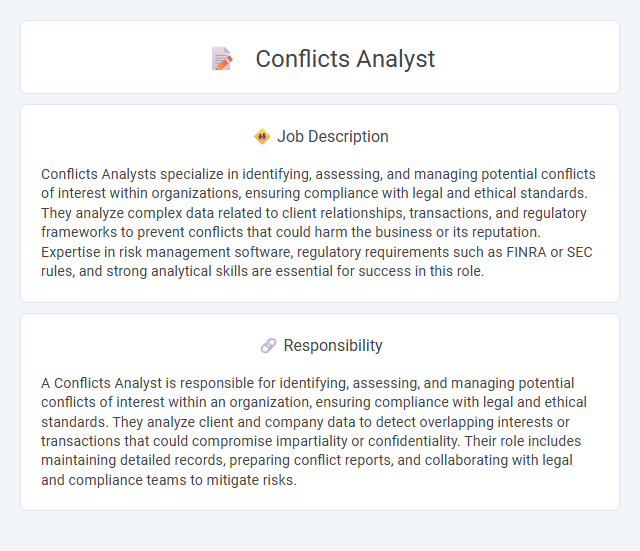
Conflicts Analysts specialize in identifying, assessing, and managing potential conflicts of interest within organizations, ensuring compliance with legal and ethical standards. They analyze complex data related to client relationships, transactions, and regulatory frameworks to prevent conflicts that could harm the business or its reputation. Expertise in risk management software, regulatory requirements such as FINRA or SEC rules, and strong analytical skills are essential for success in this role.
Individuals who demonstrate strong analytical skills, emotional intelligence, and patience are more likely to be well-suited for a Conflicts Analyst role. People who excel in assessing complex social dynamics and remain calm under pressure tend to perform better in managing and resolving disputes. Conversely, those who struggle with stress or lack empathy may find it challenging to succeed in this profession.
Qualification
Conflicts Analysts require a strong background in legal research and compliance, typically holding a bachelor's degree in law, business, or a related field; advanced certifications in risk management or compliance enhance their qualifications. Proficiency in conflict-checking software, data analysis, and excellent attention to detail are essential skills to identify potential conflicts of interest accurately. Strong communication and ethical judgment abilities enable them to collaborate effectively with legal teams and uphold organizational integrity.
Responsibility
A Conflicts Analyst is responsible for identifying, assessing, and managing potential conflicts of interest within an organization, ensuring compliance with legal and ethical standards. They analyze client and company data to detect overlapping interests or transactions that could compromise impartiality or confidentiality. Their role includes maintaining detailed records, preparing conflict reports, and collaborating with legal and compliance teams to mitigate risks.
Benefit
A Conflicts Analyst likely benefits organizations by identifying potential ethical and legal conflicts before they escalate, minimizing risk and safeguarding reputation. Their expertise in analyzing data and documentation probably enhances compliance efforts, promoting smoother operations. Employers may experience increased confidence in decision-making processes due to the analyst's proactive conflict detection and resolution skills.
Challenge
Conflicts Analyst positions likely involve navigating complex interpersonal and organizational disputes, requiring a strong aptitude for conflict resolution and critical thinking. The challenge may stem from balancing multiple stakeholders' interests while maintaining objectivity and confidentiality. Success in this role probably depends on the ability to analyze situations quickly and develop strategic solutions under pressure.
Career Advancement
Conflicts Analysts play a critical role in identifying and resolving potential ethical conflicts within organizations, ensuring compliance and minimizing legal risks. Mastery in conflict detection, regulatory knowledge, and analytical skills creates opportunities for advancement into senior compliance, risk management, or legal advisory positions. Pursuing certifications like Certified Compliance & Ethics Professional (CCEP) or advanced degrees in law or business administration can significantly enhance career growth prospects in this specialized field.
 kuljobs.com
kuljobs.com